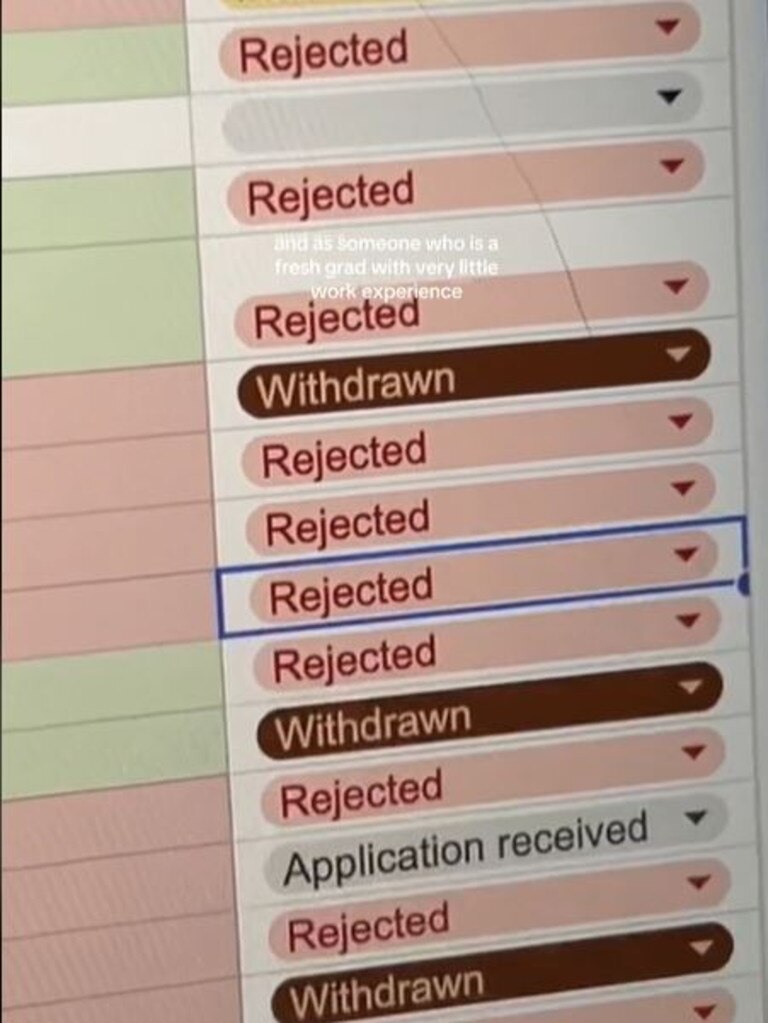‘Ghosted’: Young worker reveals brutal reality of trying to find a job right now
A big issue with Australia’s job market has been exposed, with one young worker revealing just how brutal it is for jobseekers right now.
If you have been applying for jobs this year only to be brushed off, rejected or flat-out ghosted by companies and recruiters; then you are not alone.
For a long time the state of Australia’s job market has meant employees and job seekers have been able to call a lot of the shots, but that is now starting to change.
The worsening cost-of-living crisis and a growing fear of job cuts means the power has started to shift back to employers, a move that is being clearly felt by jobseekers across the country.
Zoe Lo is one of the young Aussies who has been faced with the brutal reality of just how tough the job market is right now.
Over a four month period, the 24-year-old applied to 100 jobs and was either rejected or ghosted from about 75 per cent of those.
For two of those four months she was also unemployed and had no income.
Of those jobs, some were graduate programs and others were full-time roles in marketing, PR or social media.
Ms Lo revealed to news.com.au that, of the 100 jobs she applied for, she received “very few interviews”, saying the number was under 10.
“For many graduate roles you have to do an online assessment round as well, so I did a few of those for different companies,” she said.


Her hard work recently paid off, with the Sydneysider receiving an offer for a graduate program at a large FMCG company.
In the months she was searching, Ms Lo documented her journey on social media, opening up about the difficulties she faced.
In one recent video, the 24-year-old claimed that she was at the point in her job search where she did “not care anymore”.
At this point in time, she had applied to about 95 jobs and said that she knew it “sounded bad” but she couldn’t “fake” caring about getting a job.
Ms Lo said her mindset had shifted, noting that when she first started her job hunt she was worried about being unemployed and felt stressed about finding a job immediately.
“Now I am like, OK I am unemployed, I have no income, but I’ll be OK,” she said.
She added that, being four months into her job search journey, she was now “over it”.
“I have not applied for a job in like two and a half weeks. I barely look at LinkedIn anymore, I barely look at the graduate websites, I don’t care about the outcome. I’m not trying to control what I can’t control anymore,” she said.
Ms Lo further explained this change in mindset, telling news.com.au that “not caring” in this context was a “crude” way of saying she was starting to let go of the outcomes of her applications.
“As in, I stopped caring about the rejections and ghosting,” she said.
“In the early stages of my job hunt I felt extremely anxious and stressed all the time, which I realised very quickly stemmed from my need to control everything, in a situation where there are so many uncontrollables.
“Over time though, as the rejection (or progression) emails filtered through, I realised that life would move on anyway, regardless of whether I could control things or not, and I started to notice my initial anxieties fading simply because time passing gave me proof that I would be okay, whether I got rejected from that one job or not.”
Ms Lo clarified that she still cared about finding a job and was putting get best foot forward in interviews, but wanted to share how letting go of control made her time being unemployed “much more enjoyable”.

The young worker is not alone in her job hunting experience, with new research from HR tech company HiBob revealing one in four people surveyed found the application process so bad that they turned down a job offer.
The findings are based off a survey conducted in April 2024 of 1500 people working in office jobs in Australia.
Common complaints about the process related to poor overall communication, a lack of clarity around salaries and, in some cases, companies losing job applications.
Of those surveyed, 34 per cent said they had to wait weeks for their prospective employer to make a decision after a final interview.
For those that did get a job offer, 25 per cent claimed they have had an offer rescinded before they were due to start.
Damien Andreasen, Vice President APJ at HiBob, said at lot of these job application issues can come down to companies not having a well defined hiring process.
“Market conditions also haven’t helped, and we’ve seen a huge supply and demand swing back in favour of employers,” he said.
“It’s easy for candidates to bash the process when they don’t have a perfect experience, but having been directly exposed to the work that goes into managing hundreds of applications for each role, I do sympathise with organisations — especially large ones.”
Mr Andreasen said that workforce planning is the “elephant in the room” when it comes to the hiring process.
“Not having the right data to support the volume, type and timing for each hire will cause significant issues with processes,” he said.
“Ask any HR professional what it’s like managing open roles on a spreadsheet with little to no data to support the hiring decision. That’s the really painful part of the hiring process.”






